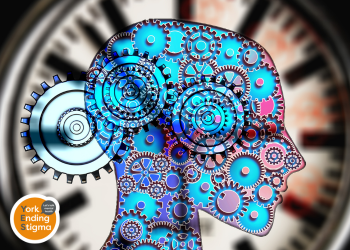
Sleep and anxiety seem to almost work in a cycle, or as a negative correlation. One thing increases, another decreases. For me, when I get more sleep, I am less anxious when I wake up, but if I am anxious about something when I go to bed, I end up staying awake at night thinking about it, leading to a lack of sleep that makes me feel even worse.
“Any anxious thoughts swirling in my mind can keep me awake for hours, sending me into a panic.”
I’ve found it’s always easier for me to fall asleep when everything is peaceful, the world around me, and the world in my head. A double decker bus going past my open window can keep me from falling asleep momentarily, but any anxious thoughts swirling in my mind can keep me awake for hours, sending me into a panic. A panic that some nights has kept me up for hours, leading to a lightheadedness that has the ceiling spinning and my breathing going rapidly and uncomfortable. In that state, all I want is to sleep but I can’t.
The problem for me isn’t just that too much anxiety means too little sleep, but too little sleep can lead to me feeling anxious too. I do try to go to bed earlier when I have something important going on early the next day, an attempt to balance out the hours of sleep I get per night. Instead I end up laying in bed wide awake, wanting to sleep but unable to do so.
“I was so overwhelmed and worried that I became dizzy and lightheaded, struggling to breathe and crying to myself.“
One of the worst cases I’ve had of feeling anxious at night happened when I began my first job. I had to get up early to arrive in time for the start of training, but the two buses I need are at specific times and can’t be missed. It was December, and I had come home from my first day of training with a headache, exhausted and overwhelmed from all of the information I had taken on during the day. The feeling of being overwhelmed became worse when I went to sleep that night, knowing that I had some four more days of training but I had no idea what it was about. All I had was the name and no details. Things took a turn for the worse at 3am, I was so overwhelmed and worried about the training and my lack of sleep that I became dizzy and lightheaded, struggling to breathe and crying to myself as it felt like it was hitting me in waves. I ended up having to call in sick, missing that day of training and thus the other three because of that. I was so weak and exhausted that I couldn’t get out of bed until 48 hours later, when the fear had numbed me enough to sleep again.
I also know from past experience, that if I don’t sleep enough at night, I’m more likely to be tired during the day. This tiredness can make me struggle with paying attention to things and feeling exhausted, instead of energised and motivated to deal with the challenges of everyday life. This makes it easy for me to go into a fight or flight response, a physiological reaction in response to stress or harm, however big or small.
“Feeling physically and mentally drained due to a lack of sleep and increasing anxiety can lead to the urge to curl up in a ball and sleep taking over my mind.“
In a lot of cases, instead of staying and fighting, or avoiding and fleeing, I freeze like a deer in headlights, the tiredness turns into panic, then leaves me even more physically and mentally drained once what my body and mind consider a stressful/harmful event has been resolved.
Feeling physically and mentally drained due to a lack of sleep and increasing anxiety can lead to the urge to curl up in a ball and sleep taking over my mind. Sadly in this day and age I cannot always curl up in a ball and sleep in the middle of the day, especially when I have something going on, such as working a twelve hour shift that can leave me exhausted for days after, or a two hour driving lesson that requires hard work and focus. Instead, I have to tough it out, control the anxiety and the exhaustion until the day is done, I can return home and try to recover the sleep lost the previous night.
“Another factor that I found that needs to be taken into account is when the sunset and sunrise are.“
Another factor that I found that needs to be taken into account when it comes to going to sleep and waking up easier, and thus with less anxiety, is when the sunset and sunrise are. Light is an example of an exogenous zeitgeber, or an external environmental cue that can affect our body clocks. I remember trying to wake up early for my first day of training back in winter, when it was still pitch black outside, the sun rising when I was heading to the bus stop and all I felt besides tired was how overwhelming it was to be awake so early, when it felt like the rest of the world was still asleep.
I have the opposite problem in the summer months. Instead of struggling to be awake after my alarm because it is so dark outside, I’m wide awake an hour or more before my alarm needs me to be, and I’m so nervous that my alarm will wake everyone up if I go back to sleep, that I can’t fall back to sleep. I am wide awake an hour before my 5:30am alarm for work, stuck laying in bed and trying not to overthink the day ahead, especially with the 12.25 hour shift waiting for me.
“I try to prepare the day before as much as possible to reduce my anxieties…Knowing that I have prepared as much as possible helps me calm my mind as I go to bed.“
I try to prepare the day before as much as possible to reduce my anxieties about my shift at work the next day, selecting the day shifts over the night shifts currently as a part of maintaining my boundaries and my mental health. There are less staff on the night shift, and being awake and on shift from 8pm until 8:15am isn’t something I feel ready enough for yet. I also prepare and gather my things the day before for any other event I may have going on the next day, so I’m not scrambling around and forgetting things before I need to be out the door.
Knowing that I have prepared as much as possible helps me calm my mind as I go to bed at night, although it does not stop me from waking up before my alarm, or still feeling tired in the morning. I try to avoid caffeine as I’ve found that it makes me feel more ill with physical anxiety symptoms if my anxiety decides to increase after consuming it.
But overall, it feels like my anxiety and the amount I sleep I get are in a constant cycle. I am still working on recognising my limits and establishing boundaries to help keep my mental health and wellbeing via my sleep schedule, healthy, so that I may be functional for everyday life, my anxiety does not get to ruin the everyday for me.
Sleep resources for England
York Ending Stigma
To find out more about our work and to join us to end mental health stigma in York, please refer to our website https://yorkcvs.org.uk/york-ending-stigma/ or email us on yes@yorkCVS.org.uk
